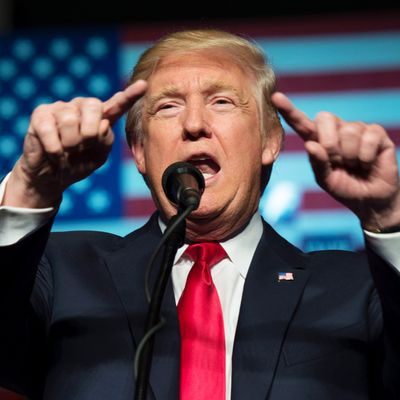
During the 2016 campaign, Hillary Clinton spent a lot of time trying to convince voters that handing the nuclear codes to an emotionally volatile reality star would be a decision they’d come to regret.
But 46 percent of the electorate begged to differ. And now we all have to lie awake tonight, trying to figure out whether this tweet is meaningless bluster, the prelude to World War III, or both.
Typically, when America’s leaders discuss nuclear strategy, they choose their words carefully — minor changes in vocabulary can signal major changes in policy. But experts on nuclear deterrence could not immediately link the phrase “strengthen and expand” to any specific policy framework.
It’s worth noting that Barack Obama has already initiated a $1 trillion nuclear modernization program — one that could be reasonably described as strengthening and expanding our nuclear capabilities.
The president’s plan involves breaking up America’s existing nuclear stockpile into smaller, more reliable weapons, including cruise missiles with nuclear tips. This allows Obama to maintain his pledge to create no “new nuclear weapons,” while developing a sleek, modern arsenal that will allow the United States to execute more finely targeted nuclear strikes.
It’s possible, then, that Trump merely intends to continue Obama’s modernization efforts under more belligerent branding.
If so, those of us who would prefer not to die in a nuclear war would still have plenty to fear: Even before Trump’s election, experts were concerned that Obama’s modernization program would heighten the risk of nuclear war.
One concern is that, by building more precise nuclear cruise missiles, the program will only make their use “more thinkable,” in the words of former vice-chairman of the Joint Chiefs of Staff James E. Cartwright.
Or, as one recent Democratic presidential nominee put it during a closed-door fundraiser last winter: “The last thing we need are sophisticated cruise missiles that are nuclear-armed.”
A separate worry is that plan will kick off a new round of nuclear proliferation, as Stephen Kinzer, a scholar of international relations at Brown University, recently argued:
Obama’s proposed “modernization” increases our vulnerability, not our security. The first and most obvious reason is that it will certainly lead other countries to seek equivalent arsenals of their own. It is especially upsetting to Russia, which already feels under increasing American threat as a result of our military maneuvers on its borders and the fact that many of our missiles are positioned in Germany, Turkey, and other countries near its territory. The Russian defense minister recently announced that in response to Obama’s plan, Russia will “bring five new strategic nuclear missile regiments into service.” China would surely match that escalation. If it does so, India will follow. Then Pakistan will jump into the race. It is a recipe for disaster.
Of course, Trump may not be referring to Obama’s plan at all. Another possibility is that he’s signaling the return of “Star Wars” — the space-based nuclear defense system that Ronald Reagan burned $30 billion on the altar of back in the ’80s.
When Congress reapproved the National Defense Authorization Act last month, it made two significant changes to the law:
1. The word “limited” was removed from America’s missile defense policy. Since 1999, the U.S. had stipulated that the purpose of its missile defense system was to thwart a “limited” or small-scale nuclear strike on the homeland. The purpose of that modifier was to signal that the United States had no intention of reigniting a nuclear arms race in outer space. But in November, with little-to-no public debate, Congress dropped that stipulation.
2. A provision calling for the military to start “research, development, test and evaluation” of space-based missile defense systems was added to the law.
“These amendments were historic in nature — given the paradigm shift forward that they represent,” congressman Trent Franks told the Los Angeles Times. “I hope that the day will come when we could have solid-state lasers in space that can defeat any missile attack.”
There’s no question that the lasers Franks describes sound wicked sweet. But there is also little doubt that, as a proposal for the defense budget (as opposed to one for a sci-fi film), they are also wicked stupid.
“It defies the laws of physics and is not based on science of any kind,” David Montague, a retired president of missile systems for Lockheed Corporation, told the Times. “Even if we darken the sky with hundreds or thousands of satellites and interceptors, there’s no way to ensure against a dedicated attack … So it’s an opportunity to waste a prodigious amount of money.”
But bipartisan majorities in Congress just voted to take that opportunity. And sending billions of dollars to defense contractors in the name of building an unstoppable space laser sounds like something Trump might do. Granted, it would be more of an expansion of nuclear defense capability, but Trump did describe his ambition in defensive terms: Until the rest of the world “comes to its senses regarding nukes,” we must strengthen our capabilities.
Or, perhaps, Trump simply means that he intends to not only modernize our nuclear arsenal, but to drastically increase its size.
Or maybe he just felt like tweeting something tough-sounding this morning.
Regardless, other nuclear powers could take Trump’s statement as an inspiration — or excuse — for pursuing nuclear proliferation of their own: On Thursday morning, Vladimir Putin told the Russian people, “We need to strengthen the military potential of strategic nuclear forces, especially with missile complexes that can reliably penetrate any existing and prospective missile defense systems.”
We live in interesting times. Here’s hoping we don’t die in them.






























